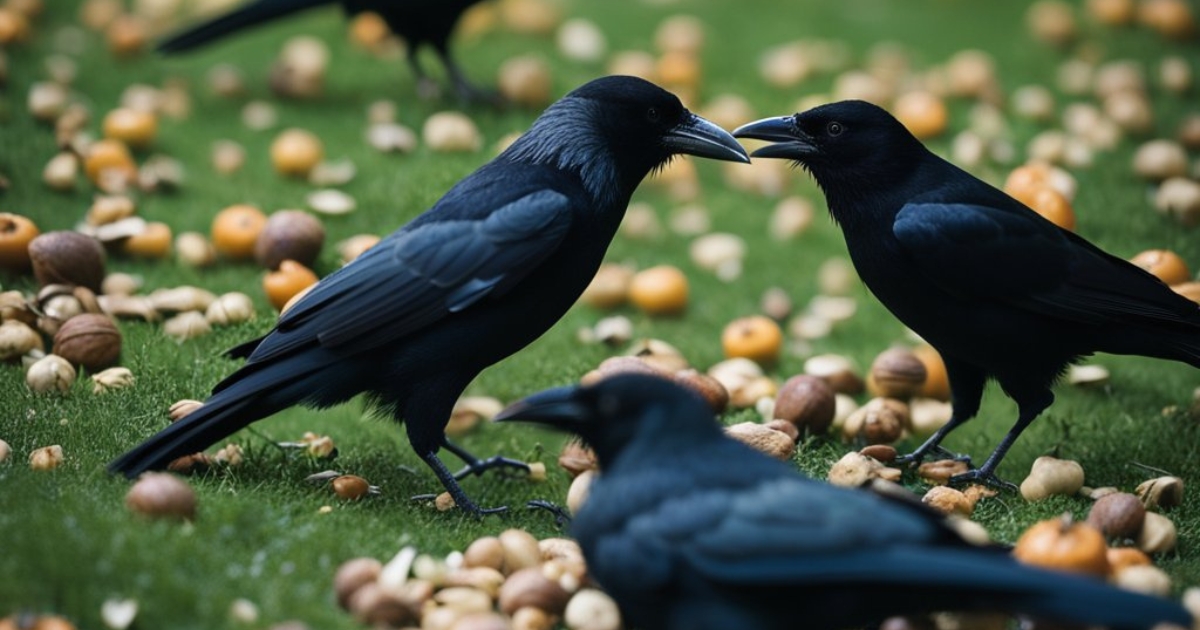Crows are intelligent and fascinating birds that have long captured the interest of humans. These curious creatures are known for their ability to adapt to various environments and their remarkable problem-solving skills. If you’re considering feeding crows in your backyard, it’s essential to understand what to feed crows and what foods to avoid. In this comprehensive guide, we’ll explore the dietary needs of crows, safe and healthy food options, and tips for creating a welcoming feeding environment.
Understanding the Dietary Needs of Crows
Crows as Omnivores
Crows are omnivores, meaning they consume both plant and animal matter. In the wild, their diet consists of insects, small vertebrates like lizards and mice, eggs, fruits, seeds, and even carrion. As opportunistic feeders, crows are adaptable and will consume a wide variety of foods based on availability.
Nutritional Requirements
Like all living beings, crows require a balanced diet to thrive. Their nutritional needs include proteins, carbohydrates, fats, vitamins, and minerals. Providing a diverse range of foods can help ensure that crows receive the necessary nutrients for growth, reproduction, and overall health.
Safe and Healthy Food Options for Crows
Seeds and Nuts
Seeds and nuts are excellent sources of protein, healthy fats, and essential nutrients for crows. You can offer them a variety of seeds, like sunflower seeds, peanuts, and mixed bird seeds. However, it’s important to provide unsalted and unroasted options, as excessive salt and processing can be harmful to their health.
Fruits and Vegetables
Fresh fruits and vegetables are not only nutritious but also provide valuable hydration for crows. Some suitable options include apples, berries, melons, corn, peas, and leafy greens. You can offer them whole or chopped into bite-sized pieces.
Eggs and Meat
Crows are naturally drawn to protein-rich foods like eggs and meat. Hard-boiled or scrambled eggs, cooked chicken or turkey, and unsalted nuts are all excellent sources of protein. However, it’s crucial to avoid feeding raw meat, as it can harbor harmful bacteria and parasites.
Bread and Grains
While crows may enjoy bread and grains, it’s best to offer them in moderation. Whole-grain bread, cereals, and cooked rice or pasta can provide carbohydrates and fiber, but they should not be the primary source of nutrition.
Foods to Avoid Feeding Crows
Salty and Processed Foods
Salty and processed foods, such as chips, pretzels, and fast food leftovers, should be avoided when feeding crows. These foods are high in sodium and unhealthy additives, which can lead to dehydration, obesity, and other health issues.
Chocolate and Caffeine
Chocolate and caffeinated beverages like coffee and soda are toxic to crows and should never be offered. These substances can cause neurological problems, heart issues, and even death in birds.
Moldy or Spoiled Food
Moldy or spoiled food can harbor harmful bacteria and toxins that can make crows seriously ill. Always ensure that the food you provide is fresh and free from any signs of spoilage.
Tips for Feeding Crows in Your Backyard
Creating a Feeding Station
Setting up a designated feeding station can help attract crows to your backyard and make it easier to monitor their feeding habits. You can use a bird feeder, a sturdy platform, or even a shallow dish placed on the ground.
Offering a Variety of Foods
To ensure a balanced diet, it’s essential to offer crows a variety of foods from different food groups. This can include a mix of seeds, nuts, fruits, vegetables, and occasional protein sources like eggs or cooked meat.
Providing Fresh Water
In addition to food, crows also require access to fresh, clean water for drinking and bathing. Setting up a bird bath or shallow dish filled with water can help meet their hydration needs.
Maintaining a Clean Feeding Area
Regularly cleaning and maintaining the feeding area is crucial to prevent the buildup of spoiled food, droppings, and other debris. This not only ensures a hygienic environment for the crows but also helps deter other unwanted pests.
The Benefits of Feeding Crows
Building a Relationship with Wildlife
Feeding crows can foster a unique and rewarding connection with nature. As you consistently provide food and observe their behaviors, you may develop a special bond with these intelligent birds, gaining a deeper appreciation for their curiosity and adaptability.
Supporting Ecosystem Balance
By providing a supplementary food source for crows, you can contribute to maintaining a balanced ecosystem. Crows play vital roles as scavengers, seed dispersers, and pest controllers, helping to maintain the delicate balance of nature.
Educational Opportunities for Children
Feeding crows can be an excellent educational activity for children, teaching them about wildlife, responsible feeding practices, and the importance of respecting and preserving nature.
Addressing Concerns about Feeding Crows
Potential Nuisance Issues
While crows are generally harmless, their presence and vocalizations can sometimes be perceived as a nuisance by some individuals. It’s important to be mindful of local regulations and consider the potential impact on your neighbors when feeding crows in your backyard.
Legal Considerations
Before embarking on a crow-feeding endeavor, it’s crucial to research and understand any local laws or regulations regarding the feeding of wildlife. Some areas may have restrictions or require permits to ensure the safety and well-being of both the birds and the community.
People Also Read:
Conclusion
Feeding crows can be a rewarding and educational experience, but it’s essential to do so responsibly and with a deep understanding of their dietary needs. By providing a balanced diet of safe and healthy foods, creating a welcoming feeding environment, and addressing potential concerns, you can foster a positive relationship with these intelligent and fascinating birds. Remember, every effort to support wildlife and maintain a balanced ecosystem contributes to the overall well-being of our planet.
FAQs
Can I feed the crows bread?
While crows may enjoy bread, it should be offered in moderation as part of a balanced diet. Bread lacks essential nutrients and can contribute to obesity and other health issues if consumed in excess.
Do crows need access to water when feeding them?
Yes, providing fresh, clean water is essential for crows. Water is necessary for drinking, bathing, and maintaining overall health and hydration.
Can feeding crows attract other wildlife or pests?
Feeding crows can potentially attract other wildlife, such as squirrels, raccoons, or even rats, to your backyard. It’s important to maintain a clean feeding area and properly store any leftover food to discourage unwanted visitors.
Is it safe to hand-feed crows?
While crows can become accustomed to the human presence, it’s generally not recommended to hand-feed them. Maintaining a respectful distance and allowing them to feed at their own pace is advisable for the safety of both the birds and humans.
What should I do if a crow becomes aggressive or territorial around the feeding area?
If a crow exhibits aggressive or territorial behavior around the feeding area, it’s best to temporarily stop feeding and remove any food sources. This behavior may be due to nesting or other territorial concerns, and it’s important to respect their space and allow them to relocate or change their behavior naturally.

